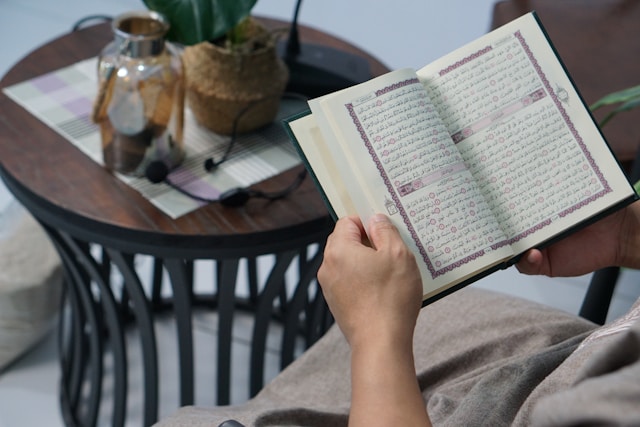The Etiquettes of Holy Quran Recitation: Reverence, Reflection, and Respect

The Quran is an important part of the life of Muslims all over the world. It is venerated as the divine word of Allah revealed to Prophet Muhammad (peace be upon him). Reciting the Quran is a profound spiritual experience that calls for devotion to specific manners and values, rather than just being a simple act of worship. We discuss the manners of reciting the Holy Quran in this blog, with a focus on respect, contemplation, and regard for this holy book.
- Purification of the Self: Before engaging in Quranic recitation, it is essential to ensure spiritual purity by performing ablution (wudu) or ritual purification (ghusl) if necessary. Purification of the body and soul prepares the reciter to approach the Quran with humility and reverence.
- Seeking Refuge in Allah: It is usual to turn to Allah in order to seek refuge from the accursed Satan before reciting the Quran. The Qur’an verse “I seek refuge with Allah from Satan, the accursed” (Qur’an, 16:98) is recited as part of the “isti’adha” practice. Seeking solace in Allah guarantees a concentrated and thoughtful recitation while shielding the reciter from outside influences.
- Reciting with Tajweed: Tajweed is the term for the rules of correct pronunciation, intonation, and articulation when reciting the Quran. Tajweed ensures that every letter is pronounced accurately and with the appropriate emphasis, which improves the elegance and accuracy of Quranic recitation.
- Maintaining Reverence and Focus: It is essential to preserve a state of regard, humility, and attention when reciting the Quran. Reciters ought to make an effort to recite with commitment and sincerity, keeping in mind the importance of the words they are speaking. A closer spiritual bond with the Quran can be achieved by minimizing outside distractions and concentrating only on the text.
- Reflecting on the Meaning: Pondering the meaning and guidance that the verses provide is one of the main goals of reciting the Quran. It is recommended that those who recite the Quran reflect on the profound guidance, wisdom, and lessons it contains, attempting to gain spiritual and personal insights from its contents.
- Reciting with Melody and Modulation: The beauty and impact of the Quran are increased when it is recited with a melodic voice and appropriate modulation. “Beautify the Quran with your voices” (Sunan Ibn Majah) is how the Prophet Muhammad (peace be upon him) emphasized the significance of vocal beauty when reciting the Quran. To fully communicate the profundity and beauty of the Quranic verses, reciters should make an effort to recite them with emotion, rhythm, and clarity.
- Observing Proper Manners: It is imperative that the physical Quran be handled with care and with respect. It is recommended that reciters set the Quran on a spotless surface and refrain from placing it on the ground or contacting it with dirty hands. In order to preserve a sense of solemnity and reverence when reciting the Quran, reciters should also avoid small chat or other distractions.

The manners of reciting the Quran include not only the technical components of pronunciation and melody, but also the spiritual guidelines of respect, reverence, and introspection. Recitalers can strengthen their relationship with the Quran, gain spiritual guidance from its verses, and live out the principles and teachings of Islam by adhering to certain customs. May the profound teachings of the Quran enlighten our hearts and minds, and may Allah provide us the guidance and knowledge to approach the text with humility, sincerity, and devotion.
Lorem Ipsum

